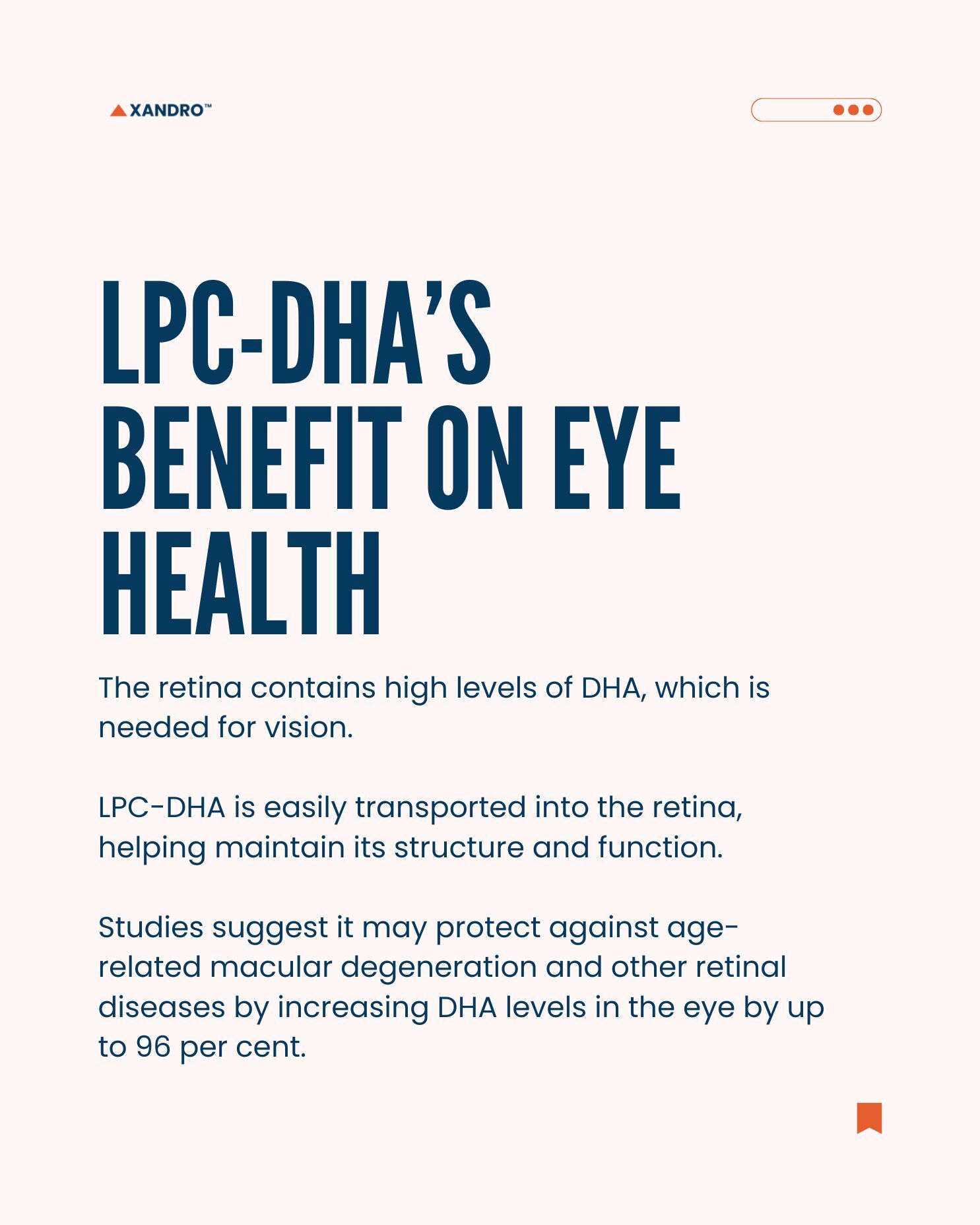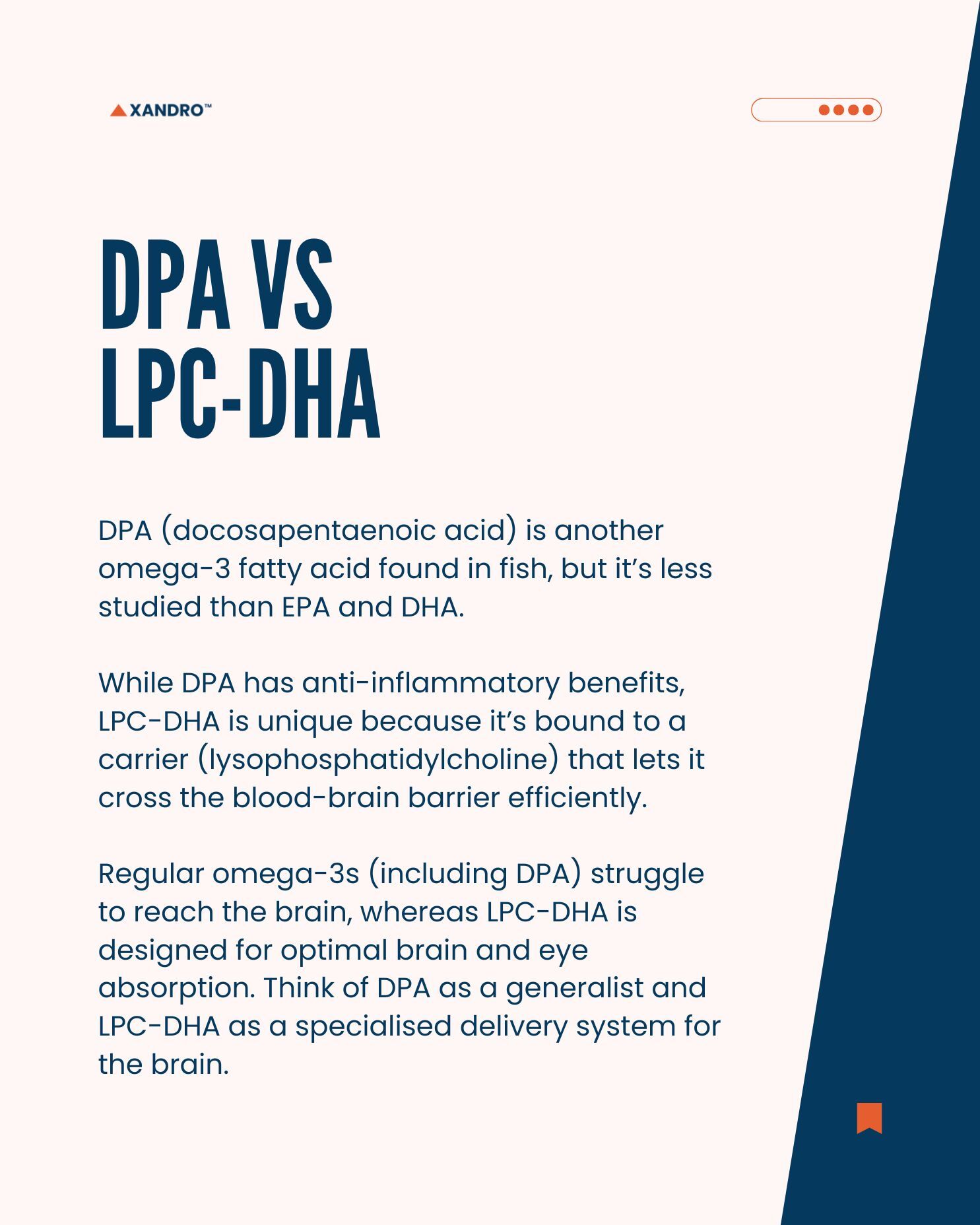What Is LPC-DHA? The Omega-3 Breakthrough That Actually Works
17th Jun 2025
LYTOVETA LPC Supplement FAQs Part 2
You've probably heard that omega-3s are good for your brain, but here's the catch: most supplements don't actually get there.
That’s why LPC-DHA is such a big deal. Think of it like a ‘backstage pass’ for omega-3s. It lets them slip past your brain’s natural security system (the blood-brain barrier) and go exactly where they’re needed. No more wasted tablets!
So, whether you're searching for:
- The best LPC-DHA supplement
- How LPC-DHA derived from krill oil compares to regular fish oil
- Or just wondering, ‘Do DHA supplements even work?’
We’re breaking it all down!
LPC Neuro and LYSOVETA™ FAQs Part 2
How does LPC-DHA help with liver health (NAFLD)?
LPC-DHA fights fatty liver disease by:
- Reducing liver fat: It’s better at decreasing fat buildup than regular omega-3s.
- Lowering inflammation: It calms liver inflammation linked to obesity/metabolic issues.
- Supporting gut-liver balance: It improves gut bacteria, which indirectly benefits the liver.

Does LPC-DHA support heart health better than regular omega-3s?
Likely yes, for two reasons:
- Stronger anti-inflammatory effects: LPC-DHA more effectively reduces artery inflammation and oxidative stress.
- Better absorption: While both types lower triglycerides and blood pressure, LPC-DHA’s superior uptake means more active compounds reach your heart and blood vessels.
Can LPC-DHA benefit eye health and retinal function?
Yes, LPC-DHA can support eye health and retinal function. The retina contains high levels of DHA, which is needed for vision. LPC-DHA is easily transported into the retina, helping maintain its structure and function. Studies suggest it may protect against age-related macular degeneration and other retinal diseases by increasing DHA levels in the eye by up to 96 per cent. This makes LPC-DHA more effective than traditional omega-3 supplements for eye health.
Does LPC-DHA help with exercise recovery and inflammation?
LPC-DHA may help with exercise recovery by reducing inflammation and oxidative stress. Omega-3s, particularly in phospholipid forms like LPC-DHA, have been shown to improve antioxidant capacity post-exercise and support muscle recovery. While more research is needed, early evidence suggests that LPC-bound omega-3s could help with inflammation and tissue repair after physical exertion.
You can also learn about the benefits of LPC DHA for major organs!
What is LYSOVETA LPC and how is it different?
LYSOVETA™ is a specialised LPC-bound omega-3 supplement derived from krill oil. Unlike regular fish oil, which contains omega-3s in triglyceride or ethyl ester forms, LYSOVETA delivers DHA and EPA in lysophosphatidylcholine (LPC) form. This allows it to cross the blood-brain and blood-retinal barriers more efficiently, making it far more effective for brain, eye and organ health compared to traditional omega-3 supplements.
Where can I buy an LPC-DHA omega 3 supplement?
If you’re looking for an LPC DHA supplement for sale, LPC-DHA supplements like LYSOVETA™ are available through specific brands, such as Xandro’s LPC Neuro. LYSOVETA™ is still relatively new to the market, so there are few manufacturers currently using it. You can learn, ‘Where can I buy LPC DHA’ here!
Is an LYSOVETA supplement the best LPC-DHA supplement on the market?
LYSOVETA™ is one of the most advanced LPC-DHA supplements available. Unlike traditional omega-3s (like fish oil), which are poorly absorbed by the brain, LYSOVETA™ is specially formulated to cross the blood-brain barrier efficiently, delivering DHA and EPA directly to brain cells. It’s derived from krill oil and enriched with LPC-bound omega-3s, making it far more effective for brain, eye and organ health than standard supplements. An LPC supplement, like Xandro’s LPC Neuro, which uses LYSOVETA™, is designed for optimal absorption and cognitive benefits.
How long does LPC-DHA stay in the body?
LPC-DHA circulates in the bloodstream for about 5–10 minutes, which is longer than free DHA (removed in ~30 seconds). Once absorbed into tissues like the brain, eyes, or liver, however, DHA has a much longer-lasting effect, supporting cell function over time. This means while LPC-DHA itself doesn’t stay in the blood for long, its benefits persist in the body’s tissues.
What are the key ingredients in LYSOVETA supplements?
Each Xandro LPC Neuro softgel contains:
- Lysophosphatidylcholine (LPC): 115mg (for brain absorption)
- Phospholipids: 280mg (supports cell membranes)
- Omega-3s (DHA + EPA): 130mg (70mg EPA, 30mg DHA for brain/heart/eye health)
- Astaxanthin: 42.5µg (a powerful antioxidant from krill)
These ingredients work together to enhance brain function, reduce inflammation and support overall health.
Are LPC-DHA supplements safe for long-term use?
LPC-DHA supplements appear to have a similar safety profile to traditional omega-3s (like fish oil). Early research suggests they’re well-tolerated, with no major side effects beyond a slight bleeding risk (common with all omega-3s), however, long-term clinical trials are still ongoing. LYSOVETA™ is tested for purity (free from heavy metals/contaminants), making it a safe choice for ongoing use. As always, speak with a doctor if you’re on blood thinners or have shellfish allergies (since krill is a source).
What is DPA omega-3 and how does it compare to LPC-DHA?
DPA (docosapentaenoic acid) is another omega-3 fatty acid found in fish, but it’s less studied than EPA and DHA. While DPA has anti-inflammatory benefits, LPC-DHA is unique because it’s bound to a carrier (lysophosphatidylcholine) that lets it cross the blood-brain barrier efficiently. Regular omega-3s (including DPA) struggle to reach the brain, whereas LPC-DHA is designed for optimal brain and eye absorption. Think of DPA as a generalist and LPC-DHA as a specialised delivery system for the brain.
You can also learn the difference between LPC DHA and LPC EPA.

Does cooking fish destroy LPC-DHA naturally found in food?
Yes, cooking or freezing fish reduces its natural LPC-DHA content. Raw fish (especially roe), krill and scallops are the best sources, but heat breaks down the delicate LPC-bound structure. That’s why supplements like LYSOVETA™ (which preserve LPC-DHA) can be more reliable for getting these brain-targeted benefits.
Why do traditional omega-3 supplements fail to reach the brain?
Most omega-3s (like fish oil) are in triglyceride or ethyl ester forms, which can’t easily cross the blood-brain barrier, which is a protective shield around the brain. They must first convert to LPC-bound forms in the body, but this process is inefficient. LPC-DHA skips this hurdle by being pre-bound to a carrier that uses the Mfsd2a transporter to enter the brain directly.
What is Mfsd2a, and why is it important for LPC-DHA absorption?
Mfsd2a is a protein that acts like a ‘gatekeeper’ in the blood-brain barrier. It specifically transports LPC-bound omega-3s (like LPC-DHA) into the brain. Without Mfsd2a, most omega-3s get stuck outside. As we age, Mfsd2a levels decline, making LPC-DHA supplements even more valuable for maintaining brain health.
End Note
That covers the basics about LPC and LYSOVETA™!
Here's the bottom line: If you want omega-3s that actually help your brain and eyes, LPC-DHA is the real deal. It works better than regular fish oil and science proves it. Want to give it a shot? Look for quality LPC-DHA supplements like LPC Neuro. Got more questions? If you haven’t read part one of our FAQs, check it out here.
